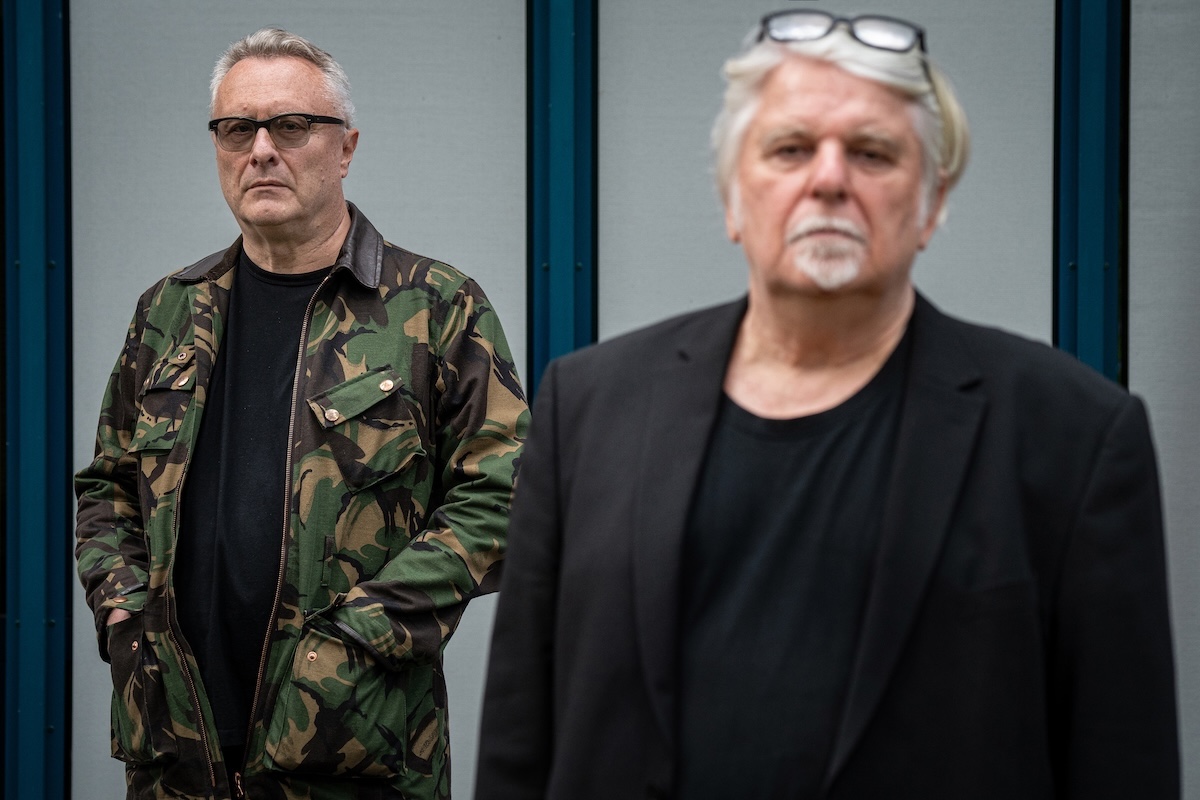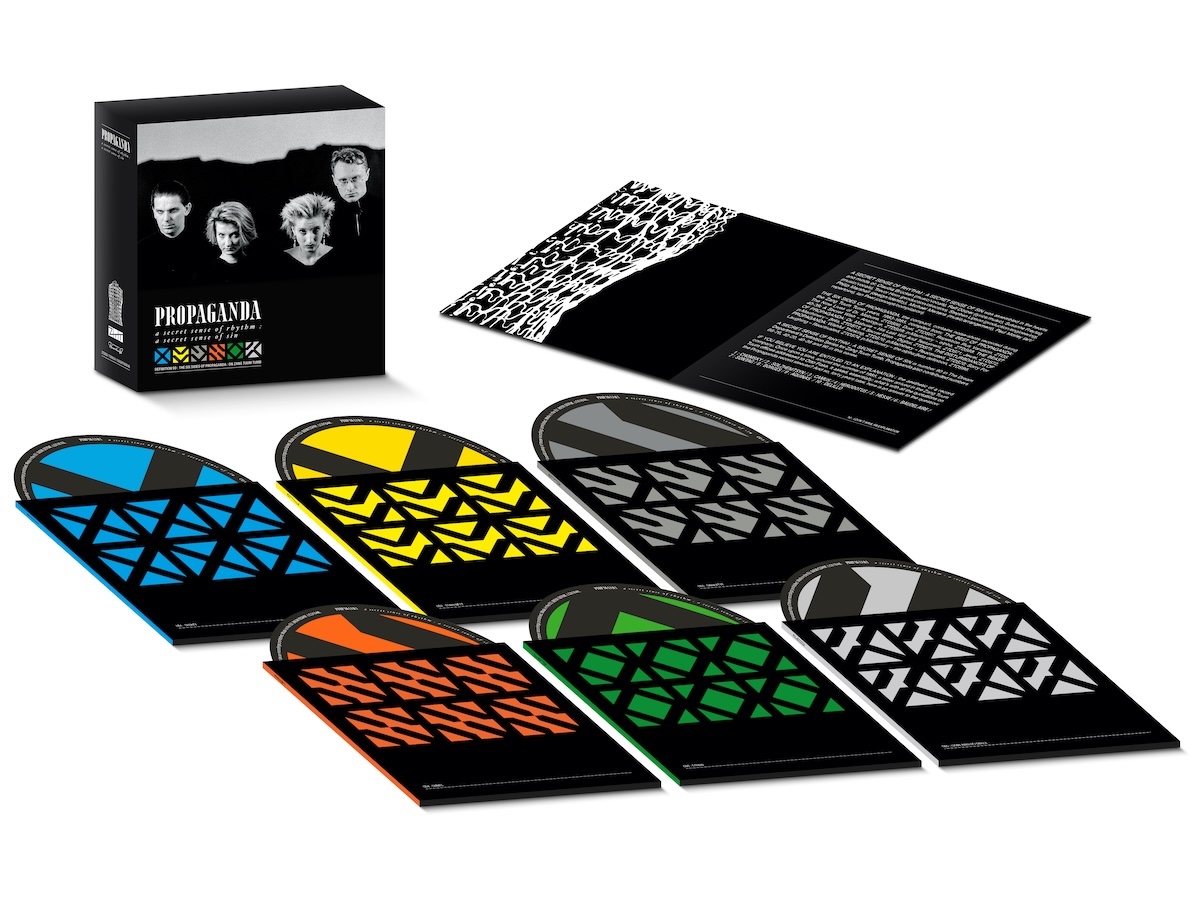Imagine an album that opens with a singer reciting an Edgar Allan Poe poem in an exotic Germanic accent over a lush symphonic backdrop. Followed by the industrial clanging of a synth-pop anthem that suddenly segues into a jazz solo by Yes guitarist Steve Howe. An album previewed by a hit single inspired by German Expressionist icon Dr. Mabuse. Made by an Olympian-looking cadre of two women and two men, assisted by a trendsetting British producer and such major ’80s stars as David Sylvian, the Police drummer Stewart Copeland, and Anne Dudley.
The album in question is A Secret Wish, the visionary debut by German quartet Propaganda, released on Trevor Horn’s label ZTT and produced by Stephen Lipson. A moderate hit in the summer of 1985, this one-of-a-kind LP casts a powerful spell; it has survived the test of time, become a cult item with a fervent fan base, and is now being reissued as a remastered 6-CD box set with demos, remixes, and live versions.
“We wanted to be really different,” says Susanne Freytag, whose sensuous reading of Poe on opening cut “Dream Within A Dream” sets the slightly delirious, cinematic mood of the session from the very beginning. “We didn’t want to have guitars or anything. There was also the notion of having two men and two women on a very equal kind of stand. An egalitarian band was the initial concept.”
“We liked the idea of being Germanic,” adds lead singer Claudia Brücken. “I was only 19 and still in art school when I joined Propaganda. We were four strong characters from wildly different backgrounds, but we weren’t overthinking it. It was quite experimental, and everybody brought different things to the table.”
“Propaganda started in the summer of 1982,” says Ralf Dörper, who was a member of the industrial metal band Die Krupps. “Initially, I thought it would be more of an underground group. The basic idea was to create sequenced music with a female voice.”
In his 2022 autobiography, Adventures in Modern Recording, ZTT’s Trevor Horn recalls co-founder Paul Morley bringing the group to the company, envisioning them as “ABBA from hell.” Fresh off his success with ZTT stars Frankie Goes To Hollywood, Horn invested time and energy into Propaganda’s debut. He hired a 30-piece orchestra to boost the band’s sound, invested 20,000 pounds on a fittingly pretentious music video, and even brought a bathtub to the studio, where it was smashed with a sledgehammer for the cacophonous symphony of noises that would become the track “Jewel.” All this for an emerging band where “nobody played an instrument.”
But just like the label’s other emerging powerhouse—collage maestros Art of Noise—Propaganda was more than a conventional group. It was an artistic manifesto.
“During the decades following the war, we were all embarrassed of being German,” says Freytag. “We started looking for a different side to our culture. We harbored a longing for the good German—the interesting, intellectual German. So we went back to our cultural roots: Dr. Mabuse, [film director] Fritz Lang, black and white photography. Hence the name Propaganda, which pointed towards the notion of consumerism and stood against the prevalent Americanization of rock. It was almost political.”

“We had this incredible opportunity to work with Trevor and Stephen, and that opened up a lot of possibilities for us,” adds Brücken. “We got to work with the best people out there.”
“Paul said that he had signed this German band, and we did ‘Dr. Mabuse,’ which was a weird experiment,” says producer Stephen Lipson, who ended up helming the bulk of the record. “But then Trevor went off to do another project, and I was given the chance to give it a go. I took it full on. They gave me access to Studio 3 at Sarm West, which was new and well equipped. It was a small room, and everything in there was black: the floor, the ceiling and walls, the console—even the chairs. I don’t know what effect that had on me, but I spent nearly a year making a record in that black room.”
“You have to understand that Propaganda was never really a band; it was a project,” says Michael Mertens. The quartet’s only professional musician, he continued playing percussion with a symphony orchestra as A Secret Wish was being made. “The concept of German electronica vibrates throughout the album, but it got elevated when we collaborated with Trevor and Steve. They translated it into their own terms.”
“The song ‘’The Murder of Love’ always appealed to me,” says Lipson. “I always thought the chorus of that tune summed up what the album was all about: the combination of a driving beat, lovely melody and beautiful chords. I love the idea of the relentless beats. It was very Germanic, and we designed it that way. It made sense.”

A Secret Wish was not all about stylistic innovation, however. The key reason for its enduring appeal may well be the desperate, unabashed romanticism that pulsates under every single song.
As the record begins to wind down, “The Chase” evokes the cosmopolitan elegance of European new wave. After the second chorus, the melody breaks in half, with massive synth chords and a military drum beat. “Oh, if I could, and you would,” Freytag whispers, and this micro-moment sums up Propaganda in all its gorgeous, melodramatic folly.
“There is a whole lifetime of tragedy in that instant,” says Freytag. “Longing, desire, unrequited love. It’s all in there for me. And it’s almost too much.”
Propaganda’s group dynamics may also have been a bit too much for the band’s future.
“I care deeply about this record,” says Lipson. “But it got nowhere at the time, and when I finished, I had to move on to something else. Then they decided to go on tour and put this band together with the drummer and bass player from Simple Minds. I just couldn’t put it together in my head. So I withdrew from the whole Propaganda setup, and then they left the label.”
“Maybe we were all a bit difficult at the time,” Brücken reflects. “But I often felt a lack of respect towards Susanne and me. I felt undermined, and that didn’t help.”

Lured by Virgin Records, Mertens released a second Propaganda album, 1234, in 1990. It featured a new singer and guest vocals by Freytag on two tracks. A luminous album blessed with a honeyed melodic sensibility, it failed to capture the gravitas of its predecessor.
The original lineup recorded an album’s worth of songs in the late ’90s, but when the demos were leaked online, they felt deflated and abandoned the project. Since then, Brücken and Freytag have recorded as xPropaganda with Lipson on board as producer, while Mertens and Dörper resurrected the moniker for a 2024 session with a younger singer. A final reunion of the A Secret Wish foursome remains unlikely.
“When you ask that question, it puts a damper on my mood,” says Mertens with a dry laugh. “It doesn’t fill me with excitement or longing. It’s more like you’re introducing a headache.”“In the famous words of Trevor [Horn], anything is possible,” adds Brücken. “But it sure would take a hell of a lot of goodwill.”



